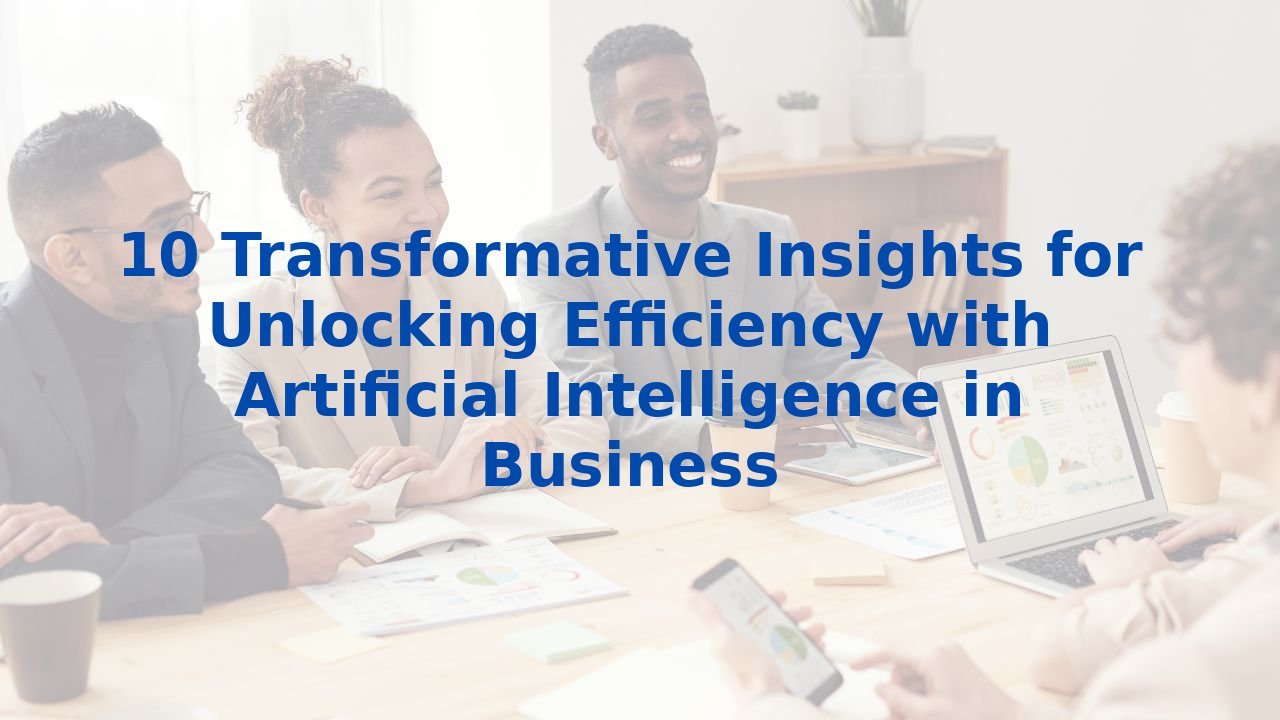10 Transformative Insights for Unlocking Efficiency with Artificial Intelligence in Business
10 Transformative Insights for Unlocking Efficiency with Artificial Intelligence in Business
In a world that never stops changing, organizations are on the lookout for the magic wand that can help them unleash operational efficiency. Enter Artificial Intelligence (AI) — a force poised not just to automate, but to revolutionize how businesses operate. Let’s explore ten transformative insights on how AI can breathe new life into your business processes and supercharge your organization’s efficiency.
1. Automating Routine Tasks
Imagine the relief of freeing up time by automating the mundane. AI excels at taking over routine tasks like data entry, appointment scheduling, and invoice processing. By employing AI-powered bots, organizations can reduce human error and speed up workflows. This liberation allows employees to redirect their creativity towards more strategic initiatives that foster innovation and growth.
2. Data Analysis and Insights
The digital landscape generates massive amounts of data daily, making human analysis feel like trying to find a needle in a haystack. AI shines in data analytics, expertly sifting through expansive datasets to reveal intricate patterns and insights. These revelations empower businesses to make data-driven decisions, tailor their marketing strategies, identify emerging trends, and adapt swiftly to market dynamics — ultimately cultivating a competitive edge.
3. Personalized Customer Experience
Today’s consumers crave personalized experiences that resonate with their preferences. AI’s capability to analyze customer data allows businesses to dive deep into browsing behaviors and purchase histories to offer tailored product recommendations. This level of personalization not only enhances customer satisfaction but also fosters loyalty and sustained engagement.
4. Predictive Analytics
Imagine having a crystal ball that can forecast future trends. AI’s predictive capabilities do just that — they analyze historical data to project demand patterns, enhance inventory management, optimize production schedules, and ensure timely maintenance. This proactive approach reduces inefficiencies and draws on resources exactly where they're needed, thus lowering costs and increasing productivity.
5. Process Optimization
With AI, the path to optimized operations is no longer a nebulous dream. By analyzing workflows, AI identifies bottlenecks and redundancies that impede efficiency. Organizations can rethink processes, automate manual tasks, and strategically allocate resources. This continuous optimization cycle fosters an agile environment where productivity thrives.
6. Quality Control and Assurance
Quality assurance becomes seamless with AI monitoring manufacturing processes in real-time. Early detection of defects prevents substandard products from reaching customers, enhancing overall product quality. This vigilance leads to reduced waste and protects the brand's reputation — two invaluable assets in any competitive market.
7. Risk Management
In a rapidly evolving landscape, understanding risks and seizing opportunities become paramount. AI empowers organizations by analyzing complex datasets to reveal potential risks and market volatility. Armed with these insights, businesses can adopt proactive measures, ultimately fostering a resilient and agile enterprise capable of weathering any storm.
8. Supply Chain Management
Supply chains are dynamic, but AI provides the precision and adaptability needed to thrive. By analyzing historical and real-time data, AI predicts demand fluctuations, optimizes inventory levels, and recommends efficient shipping routes. The outcome? Reduced delays, minimized carrying costs, and an energized supply chain ecosystem that responds robustly to changes.
9. Employee Training and Productivity
What if employee training could be turbocharged? AI-driven learning platforms enable tailored training experiences that maximize knowledge retention and engagement. By adapting content to different learning styles, employees not only enhance their productivity but also contribute to an environment of continuous improvement and innovation.
10. The Benefits of Training Your Employees for AI
While implementing AI is key, it’s imperative to ensure that employees are well-equipped to work alongside such technologies. Training empowers employees, fostering enhanced collaboration and decision-making capabilities. When they understand AI, they can harness its full potential effectively. Additionally, an AI-literate workforce is more adaptable, ensuring your organization remains agile amidst relentless change.
Conclusion
In this era of transformation, Artificial Intelligence represents more than just automation — it’s a catalyst for redefining how businesses operate. From automating routine tasks and enhancing customer experiences to optimizing processes and enabling predictive analytics, the benefits are transformative. As organizations navigate this shift, it’s crucial to invest not only in AI technologies but also in comprehensive training for your workforce. Together, these strategies unlock unprecedented efficiency and position your organization for long-term success in an increasingly competitive landscape.
Explore more about how to equip your team with pivotal AI skills by visiting Complete AI Training — your partner in future-ready workforce development.



